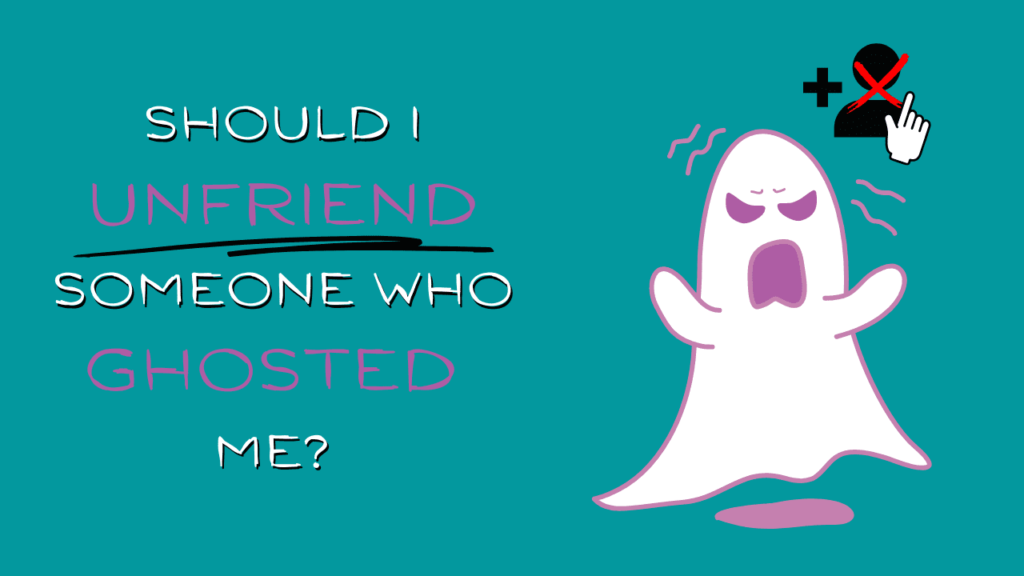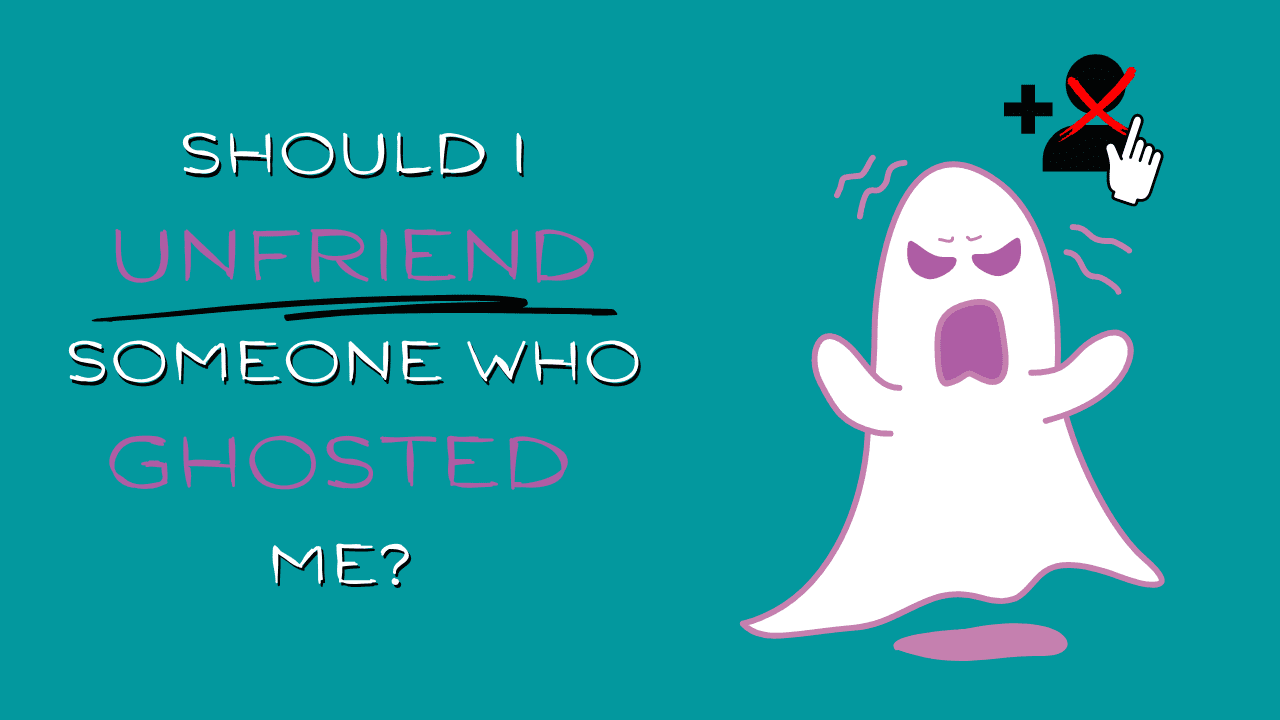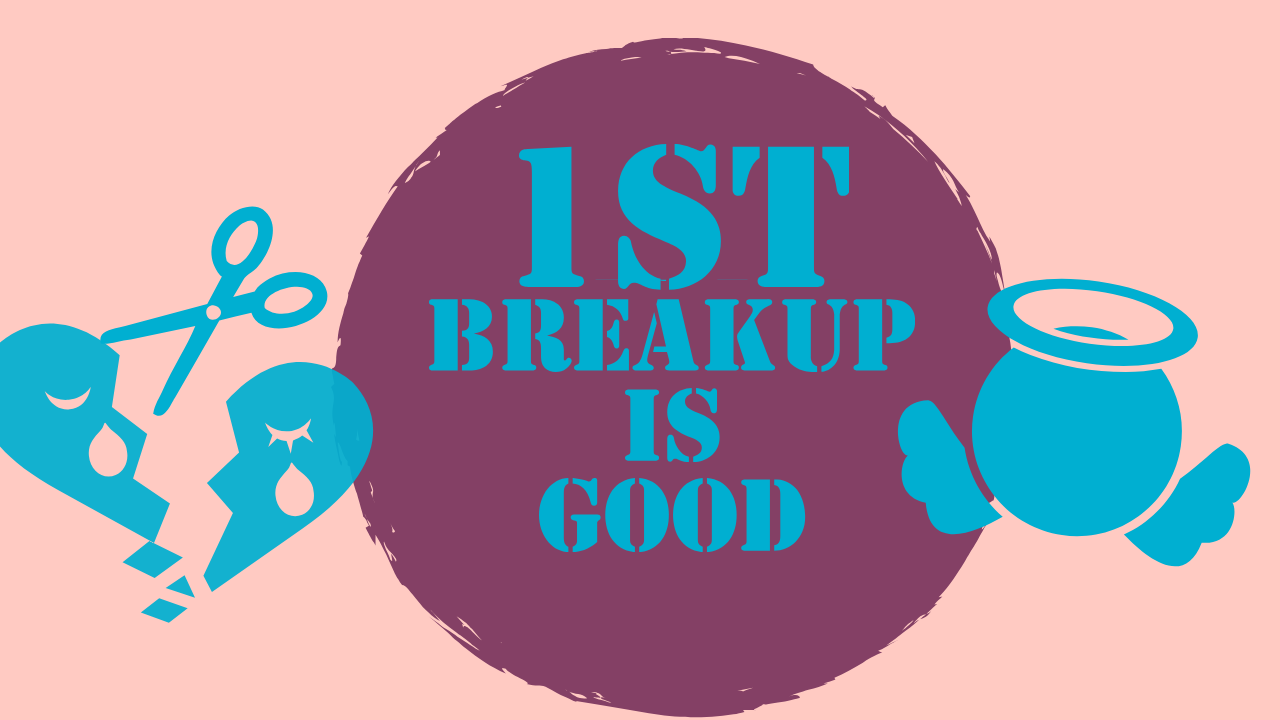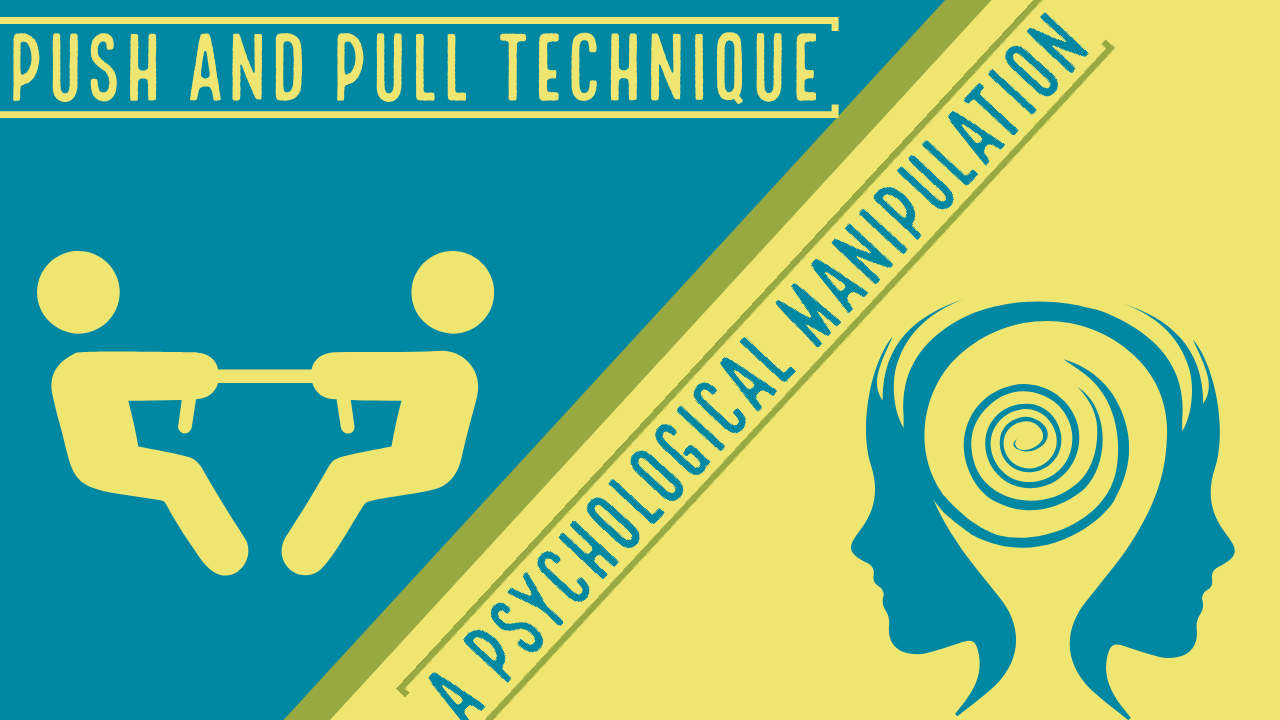When someone ghosts you, your initial feeling is perplexion. You don’t know what you did or didn’t do that made you get ghosted.
You don’t know if you said something you shouldn’t have, if you weren’t interesting or attractive enough, or if the ghoster found someone better, new, or different to spend time with.
Because you lack explanations and feel abandoned, your self-esteem quickly takes a dive and makes you take the abandonment very personally. It leaves you with no choice but to feel hurt and look for explanations without the help of the ghoster.
Even if you tell yourself that the person who ghosted you isn’t worth losing sleep over, the sad thing about being ghosted is that you still ruminate about it obsessively and wonder what you could have done differently. The shock from abandonment doesn’t give you a break, nor does it allow you to let it slide.
It wants you to first understand what happened and why it happened that way. Understanding ghosting gives you closure, which is necessary for healing whether this person was your best friend, romantic partner, or both.
People need explanations for the trauma they experience.
They deserve explanations because explanations allow them to stop feeling rejected and hopeful, get them out of denial, and give them the boost they need to heal and stop blaming themselves.
If you blame yourself for getting ghosted, you’re probably doing that because the ghoster made it look like it was all your fault. He or she refused to communicate with you, made you take ghosting personally, and forced you to look for flaws within yourself.
This is a natural response to ghosting and the separation anxiety a lack of validation and explanations cause.
But despite feeling unwanted and unimportant, you need to be strong and avoid putting yourself down. Taking responsibility for someone else’s behavior is unreasonable and unnecessary as it won’t make things any better. It will just make it harder for you to forgive yourself and move on.
By all means, acknowledge that some of the things you said or did weren’t great, but whatever you do, don’t think that ghosting’s got something to do with you. Ghosters ghost because they lack morals and patience. They don’t know how to express difficult emotions appropriately and effectively, so they run away from them and cut off their pasts.
By cutting the person they ghosted out of their life, they attempt to start anew (usually with someone new) and act as if they’re innocent. They don’t care or care much that they just ditched someone who liked them and had expectations of them.
Their life is about their choices and happiness. Your happiness comes way after theirs.
This tells you that the person in question is more than willing to cut people off without explanations as long as doing so helps him or her avoid uncomfortable conversations.
The ghoster would rather avoid talking about unwanted feelings than do what’s right and tell you why the relationship needed to end.
Yes, it’s hard to tell someone that you lost feelings and/or interest in continuing the relationship. But regardless of how hard it is, it needs to be said (preferably in person). The person you no longer like deserves to know what happened so that he or she can accept the separation and improve the things that need improving.
The worst thing someone could do to me personally (especially my partner) is disappear without telling me what I did wrong. If I’m not told about the reasons for breaking up, I’d need quite a bit of time to discover those reasons on my own. I might also fail to discover them, which would make me repeat the same mistakes in my next relationship.
Disappearing is, therefore, not a healthy way of handling difficulties. It’s a cowardly way for ghosters to deal with problems they don’t want to deal with.
So if you got ghosted and you’re looking for ways to respond to ghosting, the best advice I can give you is to not do anything crazy. Reacting to a ghoster the moment you get ghosted would show that the ghoster has power over you and that you were greatly affected by his or her ghosting.
That could tell the ghoster you’re disappointed, hurt, or angry and make him or her avoid you even more. The ghoster could also delete you, block you, or perhaps even spread rumors about you.
You may want to let emotions of anger and pain wane before you take any action that the ghoster is notified about or can see. If you immediately start calling him/her out on social media, for example, you’ll make yourself look bad and the ghoster feel cornered.
And what do cornered people do? They tend to get angry and fight back.
That won’t help your situation or make you feel better. But it will make the ghoster glad that he or she ghosted you and cut ties with you.
So give it at least a few days before you hit that delete button and unfriend the ghoster. Wait a little bit to regain your composure and rationality because when you do, you won’t just feel that you’re doing the right thing, but also see it.
In today’s post, we discuss whether you should unfriend someone who ghosted you. We also talk about blocking the ghoster and other things you can do.

Should I unfriend someone who ghosted me?
Before I answer whether you should unfriend someone who ghosted you, you should first understand what ghosting means. For some odd reason, many people think that ghosting is not showing up at the agreed place and time, and then remaining friends afterward.
That is not ghosting. It’s something between the lines of being irresponsible, uncaring, lazy, and unreliable. A ghoster is a person who without any warning or explanation ceases all communication and disappears. Such a person is done with the relationship and doesn’t care what you think about him or her anymore.
Due to a loss of attraction or interest, the ghoster thinks he or she will be happier without you. That’s why the ghoster stops responding, ignores you, blocks you, and indirectly shows you that you’re no longer a priority.
You can get ghosted on social media, over text, or in person. No matter where the ghosting happens, it indicates that the relationship or friendship is over and that you need to find closure without contact. You can’t bother the ghoster with your need for closure because he or she has already given up on you and doesn’t care about your feelings anymore.
He or she wants to avoid you like the plague and prioritize people who make him or her feel positive emotions.
Now that we’ve discussed what ghosting is, we can talk about whether you should unfriend someone who ghosted you.
The answer depends on what you want. If you still have hope for the ghoster and think that he or she deserves another chance, unfriending the ghoster probably won’t help. On the contrary, it will show the ghoster that you’re upset and that the relationship is done forever.
Of course, it doesn’t mean that the ghoster will leave you alone forever because some ghosters feel guilty and reach out after a while, but it will certainly complicate things. It will be easier for the ghoster to contact you if you don’t show any ill feelings toward the ghoster.
That’s why you should avoid acting on impulse if you’re hoping for some kind of relationship. You should wait for your anger to subside. It could take a week or longer (depending on how close you were to this person), but when you’re calm and sensible, you’ll know whether you have any respect left for the ghoster and if he or she is worth staying online friends with.
Now, most ghosters don’t stay friends with the people they’ve ghosted. They want nothing to do with them. But those who do usually don’t want to completely get rid of the person they ghosted. They want to leave a channel of communication open in case they or the person they ghosted have some sort of emergency.
Some ghosters also see unfriending as escalatory behavior and don’t want to unfriend until they’re certain the person they ghosted can handle the unfriending.
Therefore, the two most important questions you need to ask yourself are whether you got ghosted (not just ignored and belittled) and what you hope to achieve from deleting the person who ghosted you.
If you hope to punish and hurt the ghoster and make him or her want to be your friend or romantic partner, you should leave things the way they are.
There are better ways to handle ghosters on social media. And those ways require no deleting. All you need is to mute or hide notifications from the ghoster and show no hurt feelings whatsoever. Ghosters are afraid of confrontations and strong emotional reactions, so it may be better not to do anything that shows you’re unhappy with the ghosting.
However, if you can’t stop checking up on the person who ghosted you and it’s hurting you, then it’s no longer about not reacting and portraying yourself in a positive/confident light. It’s about avoiding unnecessary information, pain, and emotional setbacks by any means necessary.
If you’re hurt and don’t want to keep stalking the ghoster, you should delete the ghoster and force yourself to stop analyzing his or her social media behavior.
You should also delete the ghoster if you have no intention of resuming what you had with him or her. Deleting someone you don’t want in your life isn’t immoral, but rather self-respectful. It’s something you need to do to close this painful chapter of your life and prevent the ghoster from coming back in the future.
Here’s when you should unfriend a person who ghosted you.

If you went on just one date with someone you liked and then got ghosted, deleting this person right away may be too rash. The man or woman may have ghosted you because he or she rushed into a new relationship too quickly.
That means he or she might be emotionally ready for a relationship after a few weeks or months and might give you another chance. I don’t want to give you false hope, but deleting someone you went on just a couple of dates with could make it harder for that person to contact you.
That’s why it’s better not to delete people (even those who mistreat you) if you think they could still learn their lessons and come back around.
Should I block someone who ghosted me?
Blocking ghosters is not any different than deleting them. The only difference is that blocking completely stops them from interacting with you and coming back to you. It makes them see that they’re no longer wanted even as friends and that they may have permanently damaged the relationship.
Although occasionally ghosters find alternative ways to get back in touch with someone who blocked them, this isn’t true for all ghosters. Some ghosters see blocking as the end of the relationship and think that the person who blocked them doesn’t want to communicate with them anymore.
Oftentimes, the person who resorts to blocking is just hurt and is looking for explanations, validation, and comfort.
So if you’re thinking about blocking the ghoster to make him or her care and make you feel better, know that the ghoster might not come running back just because you’ve blocked him or her. The ghoster may instead think that you’re angry and that you want nothing to do with him or her anymore.
For those reasons, it may be better not to block a ghoster or even a blocker. People sometimes deal with their unwanted emotions after a while and regret acting on them.
That doesn’t necessarily mean they regret leaving the relationship but that they regret leaving in an unhealthy manner.
My advice is to block the ghoster only if you want to or need to. You would want to block if you don’t want the ghoster to enter your life again and need to block him or her if seeing his/her posts hurts you and delays your healing.
Should I befriend or re-add someone who ghosted me?
If you regret deleting or blocking someone who ghosted you and it’s been weeks since you did that, I think that leaving him or her blocked may be the best thing to do. The ghoster has likely already realized that he or she is blocked or unfriended and would likely receive a notification from you when you decide to unblock/re-add.
That would show you’re emotional, fickle, and highly reactive to the things he or she did or does. You’re spending way too much time thinking about someone who ghosted you and hasn’t reached out to you since.
A ghoster may feel uncomfortable if you appear out of nowhere. He or she could also ignore you or your friendship requests and make you feel rejected again.
So consider unblocking (not re-adding) a blocker only if you realize you still have feelings for the ghoster, if you blocked the ghoster recently, or if you want some kind of relationship with him or her. Unblocking just because you’ve calmed down a bit and realized you reacted strongly probably isn’t a reasonable thing to do.
And lastly, if a ghoster unblocks you and sends you a friend request, then the same principle applies. Re-add the ghoster if you think that the relationship between you and the ghoster is worth working on.
Ultimately, what you do is up to you, but if you feel disrespected and don’t want the ghoster back, unfriend him or her and move forward. Life is too short to wait for people to realize they mistreated you.
Do you think you should unfriend someone who ghosted you? Share your opinion with us in the comments section below. We’ll get back to you shortly.
And if you’d prefer to talk to us sooner and in detail, click here to subscribe to 1-on-1 coaching with us.
My name is Zan and I’m the founder of Magnet of Success. I enjoy writing realistic relationship and breakup articles and helping readers heal and grow. With more than 5 years of experience in the self-improvement, relationship, and breakup sphere, my goal is to provide advice that fosters positivity and success and avoids preventable mistakes and pain. Learn more about me or get in touch today.



Ghosting is awful and leaves us in a turmoil of open questions and emotions just as you very accurately described. It’s been a year and I’m still not over it. This is one of the best articles about ghosting that I’ve come across, thank you for raising awareness Zan!
Hi Marco.
I’m sorry to hear your ex has caused you so much suffering. I hope that you recover quickly and avoid developing any trust issues.
Sincerely,
Zan
Hey Zan, I’m struggling for months after being ghosted. In the 5th month, but It’s too hard to let go of hope. Of course I want him to come back, but I feel he is getting an ego boost by having access to me thru my instagram. This is the second time he ghosted (the first time, he came back around in 3 months). Do the same rules apply? Keep him as a friend?
Hi Lola.
This is the second time he ghosted you, so you need to lose faith in the guy. You need to stay in NC and work on losing hope. He’s not getting an ego boost from staying your friend. He doesn’t need your validation or anything like that. So delete him only if it’s hurting you.
Best,
Zan
As hurtful as ghosting is, the individual is showing you early on how they respond and act on feelings of stress, the way they have behaved shows they are incapable of a healthy relationship unless they work on themselves (which some people never do) for them to ghost in the first place shows they have serious growth to do.
Emotional maturity is sexy!
Hi Annie.
I couldn’t agree more. Thanks for commenting!
Zan
Hello Zan,
Looking forward for an article about serial daters and monogamists from you. Big fan of your work.
Hi Deepika.
Thanks for reading the blog. Stay tuned!
Zan
Another amazing article from you Zan
I totally agree that people ghost because they lack morals and patience
And I always learn more from you ❤️
Thanks for commenting, Linda!
Always glad to see you.
Zan
Hello Zan,
Thank you for this very nice and sensible article. The paragraph on wanting to know what you did wrong particularly rings a bell to me; I also tend to need to rationalize what happens to let go. I have now come to terms that sometimes just “feeling the feelings” is the best answer: feeling disrespected is a closure on its own. Ghosting may be the best way a ghoster knows how to end things (gaslighted with “this is not what you think, I would have responded” or benched with “I hope you don’t blame me too much for this and we can keep our special connection” after calling them out are far worst to me).
At the end of the day, when you are detached, the question of unfriending people after ghosting becomes quite secondary. I have better things to worry about (like my own behavior for example)
Best wishes !
Hi Benoit.
Thanks for the comment, it definitely got me thinking. Feelings of disrespect can indeed be closure as they boost your sense of self-respect and worth. The hard part is detaching to the point where you don’t care anymore. That’s what NC is for.
Best regards,
Zan